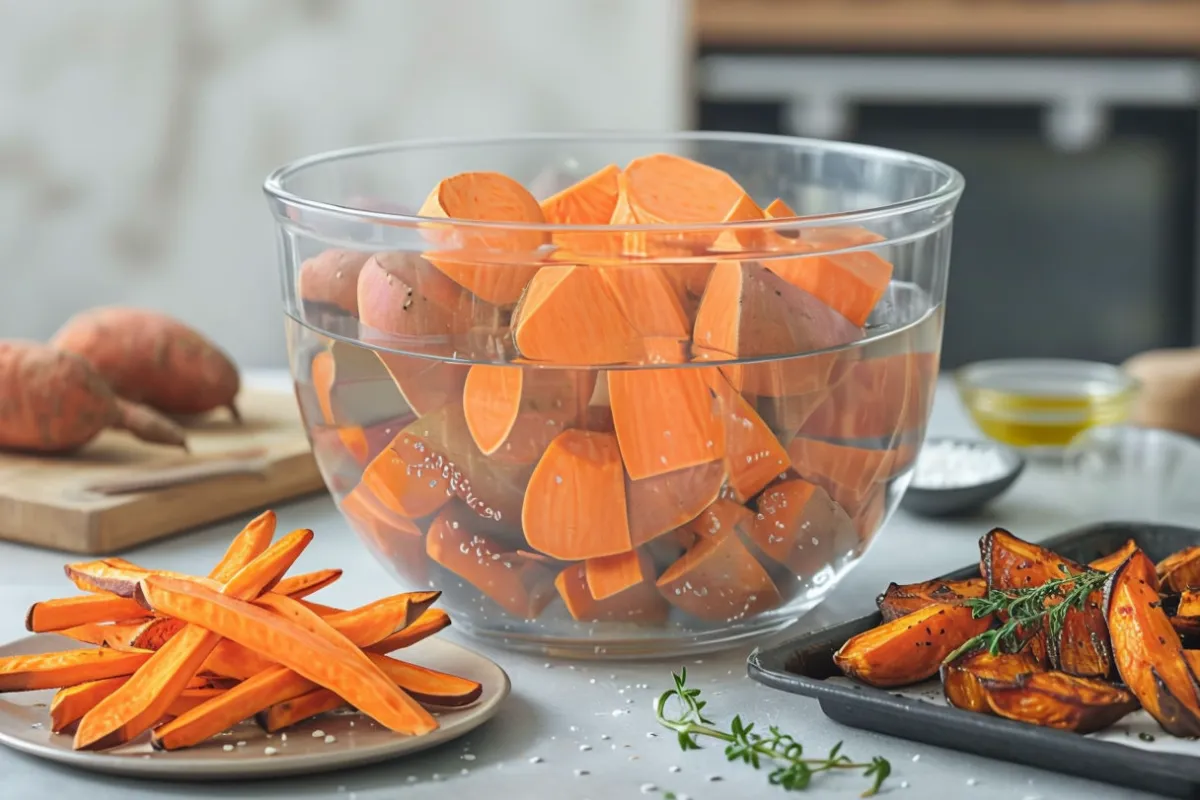Soaking sweet potatoes before cooking is a step that many overlook. However, soaking can enhance the texture, flavor, and overall outcome of your dishes. From crispy fries to evenly roasted potatoes, soaking sweet potatoes can make a significant difference. In this article, we explore why soaking is essential, how to do it properly, and which dishes benefit the most from this technique. Whether you’re making fries, roasting them, or adding them to casseroles, understanding the science behind soaking will elevate your cooking skills.
Understanding the Basics of Soaking Sweet Potatoes
Sweet potatoes have long been a staple in various cuisines, prized for their natural sweetness and versatility. However, one common question that comes up is: Why do you need to soak sweet potatoes before cooking?
The answer lies in the benefits of soaking, which include improved texture, reduced cooking time, and better flavor absorption. Soaking sweet potatoes is an easy technique that can yield amazing results, especially when frying or roasting.
The Science Behind Soaking Sweet Potatoes
Removing Excess Starch
One of the primary reasons for soaking sweet potatoes is to remove excess starch. Potatoes, including sweet potatoes, contain natural starch that can affect the texture of your dish. By soaking them in water, you allow some of this starch to break down and wash away. This process is especially important when making crispy sweet potato fries or roasting sweet potatoes, as the starch can prevent them from crisping up.
Without soaking, sweet potatoes can turn out soggy or unevenly cooked. Removing starch allows the sweet potatoes to become crispier when roasted or fried, giving you that perfect bite.
Water Absorption and Reduced Cooking Time
Soaking sweet potatoes also helps them absorb water, which in turn reduces the overall cooking time. When sweet potatoes are soaked, the water begins to hydrate the vegetable, making it easier to cook through. This hydration is beneficial for dishes where you want the potatoes to remain tender on the inside but crispy on the outside, like baked sweet potato fries.
According to research on soaking potatoes, the process of soaking helps with even cooking. This technique ensures that the heat reaches every part of the potato, resulting in evenly cooked fries or wedges.
Softening the Texture
Soaking is not only about achieving crispiness. In some recipes, you might want sweet potatoes with a soft and creamy texture. Soaking sweet potatoes before cooking helps break down their fibers slightly, which can lead to a softer texture. Whether you’re baking or roasting, soaking allows for a more even cook and a velvety smooth finish. This can be especially helpful in recipes like sweet potato casseroles or mashed sweet potatoes.
Benefits of Soaking Sweet Potatoes
Crispier Fries and Roasted Potatoes
As mentioned earlier, the biggest benefit of soaking sweet potatoes is achieving crispier results. Whether you’re making fries or roasted wedges, soaking helps remove starch that can hinder the crisping process. The soaked potatoes will cook more evenly and result in a golden-brown, crispy exterior with a tender interior.
For those who love sweet potato fries, this trick is a game changer. Without soaking, the fries can end up soft and limp rather than crisp and satisfying. Learn more about making crispy roasted sweet potatoes by understanding the importance of soaking.
Improved Flavor Absorption
Soaking also enhances the flavor absorption of sweet potatoes. When sweet potatoes are soaked, they not only lose starch but also become more porous. This makes it easier for the sweet potatoes to absorb any seasoning, spices, or marinades you may add later. Whether you’re using sweet or savory flavors, soaked sweet potatoes will lock in those flavors more effectively.
For dishes like spiced roasted sweet potatoes or sweet potato fries, soaking allows the seasoning to penetrate deeper, giving a more robust flavor.
Easier and Faster Cooking
Soaked sweet potatoes are quicker and easier to cook. When sweet potatoes absorb water, they soften slightly, making it easier for heat to permeate through the vegetable. This leads to shorter cooking times, which is especially useful when roasting or frying in large batches. Not only does this save time, but it also ensures that all the pieces cook uniformly, preventing some from overcooking while others remain undercooked.
How Long Should You Soak Sweet Potatoes?
Ideal Soaking Time
For most recipes, soaking sweet potatoes for about 1 to 2 hours is ideal. This time allows the potatoes to fully hydrate and ensures that the excess starch is removed. If you’re aiming for crispy fries or perfectly roasted sweet potatoes, this soaking time will yield the best results.
For those who prefer to plan ahead, soaking overnight is also an option. However, it’s important not to soak sweet potatoes for too long, as they can become waterlogged and lose some of their natural flavor.
Overnight Soaking
Soaking sweet potatoes overnight can be convenient, especially if you’re preparing a meal in advance. Overnight soaking is done in cold water, allowing the potatoes to remain fresh and hydrated without over-softening. However, it’s important to note that leaving sweet potatoes in water for too long can dilute their flavor and cause them to become mushy. For best results, soak them for no more than 8-10 hours if you’re opting for an overnight method.
Quick Soaking Techniques
If you’re short on time, you can opt for a quick soak by using warm water. This method accelerates the starch removal process and helps soften the sweet potatoes faster. A quick 30-minute soak in warm water can be effective for dishes like air-fried sweet potatoes or roasted cubes.
Common Mistakes When Soaking Sweet Potatoes
Over-Soaking Sweet Potatoes
One common mistake is over-soaking sweet potatoes. Leaving them in water for too long can cause them to absorb excess moisture, leading to a mushy texture. This is especially problematic for dishes that require crispiness, like fries or roasted wedges. If you’re soaking sweet potatoes overnight, be sure to limit the soak time to a maximum of 10 hours.
Not Drying Sweet Potatoes Properly
Another mistake is not drying the potatoes after soaking. When sweet potatoes are wet, they tend to steam rather than crisp when cooked. To avoid this, make sure to dry the potatoes thoroughly using paper towels before roasting or frying them. This ensures that the sweet potatoes will become crispy and golden when cooked.
Skipping the Soaking Step
Skipping the soaking process can result in less crispy and unevenly cooked sweet potatoes. While it may seem like an extra step, soaking is crucial for achieving the perfect texture, especially in fried or roasted recipes. Skipping this step could mean soggy fries or dry and unevenly cooked roasted potatoes.
Sweet Potato Recipes That Benefit from Soaking
Crispy Sweet Potato Fries
One of the most popular uses for soaked sweet potatoes is in making crispy sweet potato fries. By soaking the fries for at least an hour, you can ensure they come out crispy on the outside while remaining soft on the inside. Simply soak the fries, dry them thoroughly, and bake or fry them for a satisfying crunch.
Roasted Sweet Potatoes
Roasted sweet potatoes are a delicious side dish, and soaking helps ensure an even roast with crispy edges. Whether you’re using whole wedges or cubes, soaking the sweet potatoes beforehand improves texture and flavor.
Air-Fried Sweet Potatoes
For those who love using the air fryer, soaking sweet potatoes before air frying them can improve crispiness. Air frying typically requires less oil, but soaking helps the potatoes achieve a crunchy texture without becoming too dry.
Enhancing the Flavor of Soaked Sweet Potatoes
Adding Seasonings to Soaked Sweet Potatoes
Soaking sweet potatoes makes them more porous, which means they can absorb seasonings and spices better. Once the potatoes are soaked, season them with salt, pepper, paprika, or even cinnamon and sugar for a sweet twist.
Soaking Sweet Potatoes in Seasoned Water
Another option is to soak sweet potatoes in water that has been seasoned with herbs, garlic, or even a bit of salt. This allows the potatoes to absorb the flavors before cooking, enhancing the overall taste of the dish.
Marinating Sweet Potatoes Before Cooking
For more intense flavors, you can marinate sweet potatoes after soaking them. This method works particularly well for savory dishes like spicy roasted sweet potatoes or garlic sweet potato fries.
FAQs About Soaking Sweet Potatoes
Do you need to soak sweet potatoes before roasting?
While it’s not absolutely necessary, soaking sweet potatoes before roasting can improve their crispiness and texture. This is especially true if you’re aiming for caramelized edges and a tender interior.
How long should you soak sweet potatoes before cooking?
For best results, soak sweet potatoes for about 1 to 2 hours. If you’re in a rush, a quick 30-minute soak in warm water can also work well for achieving crispy fries or roasted sweet potatoes.
Does soaking sweet potatoes affect the flavor?
Soaking sweet potatoes doesn’t drastically change their flavor but allows them to absorb seasonings better. Soaking also helps achieve a better texture, which can enhance the overall taste of the dish.
Conclusion
Soaking sweet potatoes before cooking offers numerous benefits, from achieving crispier fries to reducing cooking time. Whether you’re frying, roasting, or baking sweet potatoes, taking the time to soak them can greatly improve the results. Incorporate this simple step into your cooking routine, and enjoy delicious, perfectly cooked sweet potatoes every time.

